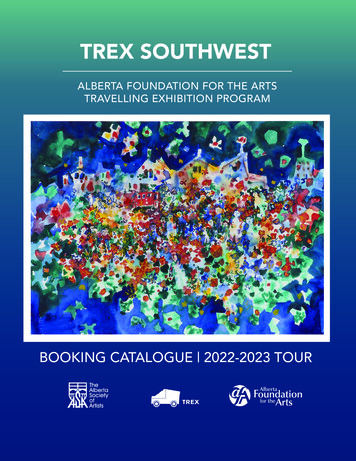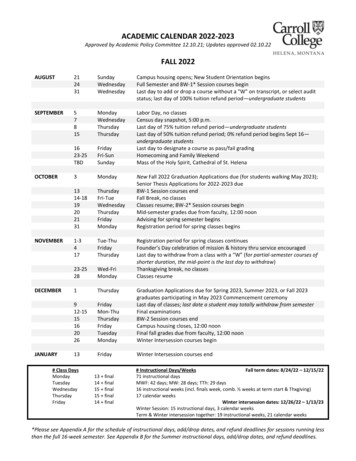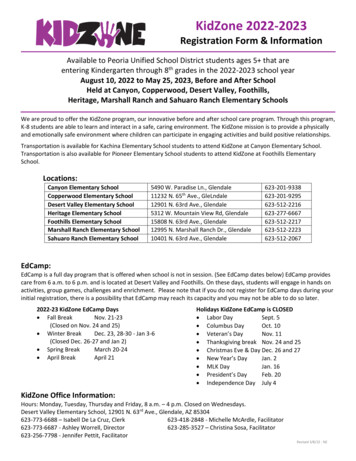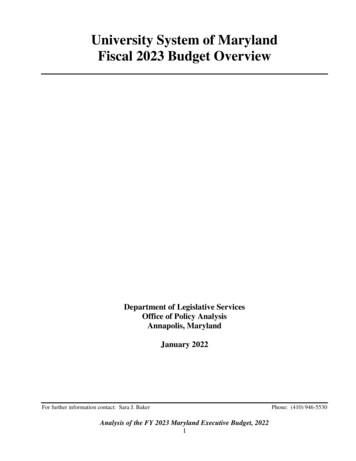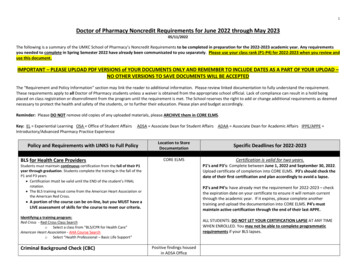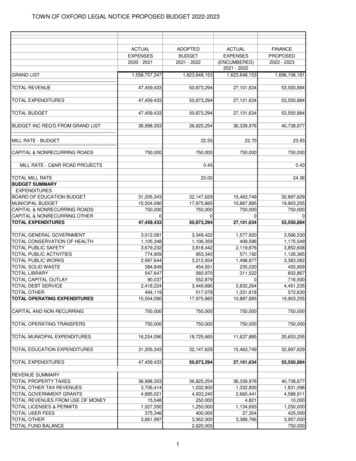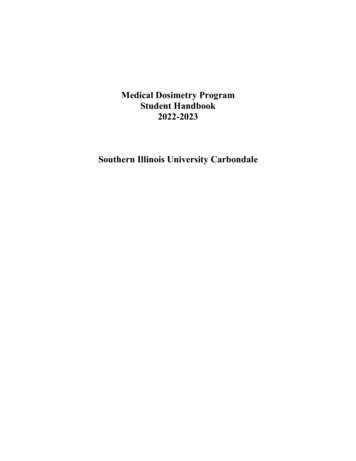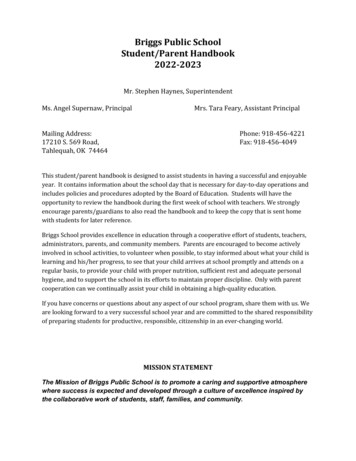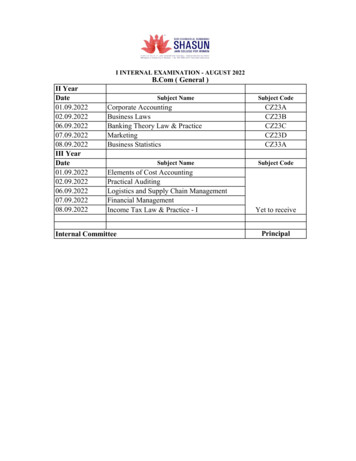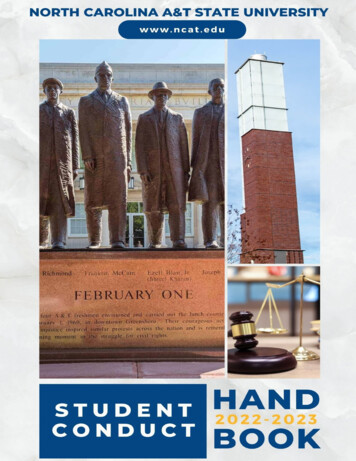
Transcription
2022-2023 Student Conduct Handbook1
TABLE OF CONTENTSI.STUDENT CONDUCT REGULATIONS . 3II.STUDENT CONDUCT PROCEDURES . 12III.HEARING AND APPEAL PROCEDURES . 18IV.APPELLATE PROCEDURES . 23V.ADDITIONAL IMPORTANT POLICIES AND NORTH CAROLINA GENERAL STATUTES. 25VI.APPENDICES . 26A.B.C.D.E.F.Statement of Purpose .3Statement of Policy .4Definition of Student .5Student Rights and Responsibilities .6Conduct Prohibited by the University .6Academic Dishonesty .11A.B.C.D.E.F.G.Allegations of Misconduct and Filing of Charges .12Review by the Vice Chancellor for Student Affairs/Designee .13Rights of the Accused.14Rights of Persons Bringing Charges.15Waiver of Rights to a Hearing .15Records .16Referral to a Conduct Board .171. Administrative Hearing Panel .172. Student Conduct Council .173. University Judicial Tribunal (academic dishonesty appeals only) .17H. Hearing Notification .18A.B.C.D.E.F.G.H.Presence of Advisors and Observers at Hearings .19Evidence and Burden of Proof .19Confidentiality of Deliberations .19Deliberations .20Decision.20Notice of Decision .20Parental Notification .20Sanctions .21A. Basis for Appeal .23B. Filing an Appeal .24C. Process of Appeal .24A. Title IX Policy .25B. Firearms on Campus .25C. University Drug and Alcohol Policy .25A.B.C.D.E.Student Organization Code of Conduct .26Unlawful Harassment and Discrimination .26ADA/504 Grievance Procedures .26UNC Policy (700.4.1) on Minimum Substantive and Procedural Standards .26N. C. A&T Procedure on Disruptive Behavior in the Classroom .261. Binding Procedures for Instructors .262. Student Right to Appeal .272022-2023 Student Conduct Handbook2
This Student Conduct Handbook is a source of information on the Code of Student Conduct ofNorth Carolina Agricultural and Technical State niversity (“N.C. A&T”). This Student ConductHandbook does not constitute a contract, express or implied, between N.C. A&T and its students,parents of students, or any other individual. N.C. A&T reserves the right to alter, amend, or rescindany provision in this Student Conduct Handbook at any time. Changes in this Student ConductHandbook may be implemented immediately throughout the academic year and these changes willbe posted on the web version of the Student Conduct Handbook accessible via the N.C. A&Twebsite. Each student is responsible for maintaining current knowledge of regulations at all times.Students will also be notified of any changes to this Handbook via e-mail to their @ncat.eduaddress.”N.C. A&T is committed to equality of opportunity and prohibits discrimination based on the followingprotected classes: race/ethnicity, color, genetic information, national origin, religion, sex (includingpregnancy and pregnancy-related conditions), sexual orientation, gender identity, age, disability,political affiliation, and veteran status (including relationship or association with a protected class), orany other basis protected by law. For inquiries regarding non-discrimination policies, contact LindaMangum, Director of Employee Relations and Affirmative Action Officer, lmangum@ncat.edu.I.STUDENT CONDUCT REGULATIONSSection 502 D of the Code of the Board of Governors of the University of North Carolina givesthe Chancellor of each constituent institution, or their delegate, the authority and the duty toregulate student affairs and student conduct and discipline. At North Carolina Agricultural andTechnical State University, the Chancellor has delegated the regulation of student conductand discipline to the Vice Chancellor for Student Affairs. Pursuant to this authority, andconsistent with Chapter 700 of the UNC Policy Manual, the following Student ConductRegulations and Procedures have been developed.A. Statement of PurposeAs an academic community, N.C. A&T has an interest in the safety, welfare and educationof its community members and in the promotion of an environment consistent with theeducational mission, purpose and operation of the university.Through orientation activities and student-faculty interaction, the university encouragesand promotes organized student life. Additionally, individual and group counseling aremade available through Counseling Services, the Student Health Center, and Office ofAccessibility Resources.2022-2023 Student Conduct Handbook3
B. Statement of PolicyStudents voluntarily enter N.C. A&T and are obligated to perform and behave in a mannerrelevant to the University’s lawful mission, processes and functions. Expectations ofstudents in an academic community are higher than those of citizens in a non-academiccommunity.NC A&T educates students who violate its’ community standards through the impositionof sanctions. The Goals of the educational process are as follows:1.2.3.4.5.To educate the student by explaining the reasons for community standards;To bring the student’s behavior into compliance with community standards;To have the student maturely accept accountability for the student’s behavior;To help clarify the student’s values as they concern behaviors in question;To assist the student in making future choices which enable the student toassume major adult roles of responsibility;6. To help students consider, in advance, consequences of their behavior;7. To determine, with the student, the reason(s) for misconduct; and8. To protect the safety and welfare of the university community.Procedures and processes set forth in the Student Conduct Regulations are not intendedto be equivalent to the process of federal or state criminal law. Criminal processes andprocedures are designed for circumstances unrelated to the academic mission of theuniversity.In exercising its disciplinary authority, the University is committed to the principle of equaltreatment, including a like sanction for a like violation.The University embraces and strives to uphold the freedoms of expression and speechguaranteed by the First Amendment of the U.S. Constitution and the North CarolinaConstitution. The University has the right, under appropriate circumstances, to regulatethe time, place and manner of exercising these and other constitutionally-protected rights.It is the discretion of the Vice Chancellor for Student Affairs and the Chancellor tointerpret and apply the provisions of the Student Conduct Regulations. In makingdecisions, the rights of students and the needs of the University in accomplishing itseducational goals and mission will be considered.The University has jurisdiction over all behavioral infractions that occur in facilities onproperty owned, controlled or used by the university. The University reserves the right to2022-2023 Student Conduct Handbook4
consider the off-campus behavior of students when it is determined that the behaviorinterferes with or impacts the University and its educational mission. The Vice Chancellorfor Student Affairs shall make this judgment on a case-by-case basis and determine whenthe University’s educational interests are adversely affected.The fact that a student is or has been prosecuted in criminal court for a violation of lawdoes not preclude University jurisdiction over the misconduct. The University may pursuedisciplinary action against a student at the same time the student is facing criminalcharges for the same offense, even if the criminal prosecution is pending, has beendismissed, or the charges have been reduced. Governmental authorities are not precludedfrom taking action against students for on-campus violations of public laws.University police officers are law enforcement officers commissioned by the State of NorthCarolina and have full enforcement and arrest powers. University police officers areempowered to arrest students and other persons who violate state law, local law and/orcampus regulations while on the campus of N.C. A&T or within the extraterritorialjurisdiction near the campus as agreed upon by N.C. A&T and the City of Greensboro.By action of the UNC Board of Governors, the Chancellor has ultimate authority in theregulation of student conduct. Consistent with the delegation of this authority from theChancellor, the Vice Chancellor for Student Affairs and the Dean of Students may changeor suspend any student conduct processes, as necessary, in furtherance of the welfare ofthe University or its students. All violations of conduct prohibited by the university arereported to the Office of the Vice Chancellor for Student Affairs, which has the authorityto delegate enforcement to certain persons and bodies for the purpose of implementingapproved procedures.C. Definition of StudentPersons covered under the Student Conduct Regulations are identified as students:“Student(s)” includes all persons enrolled in courses delivered in any manner by theuniversity, either full or part‐time, for credit or non-credit, undergraduate or graduate.Student(s) also include those who have been notified of their acceptance for admission,persons who withdraw after allegedly violating the Student Conduct Regulations, personswho are not enrolled for a particular term (but who have not officially withdrawn from theuniversity), but who enroll in courses from time to time, and those who have a continuingrelationship with the university (e.g., on academic suspension or academic dismissal,disciplinary suspension or studying abroad).Note: A person is no longer a student upon graduation, official withdrawal, expulsion, ordeath.2022-2023 Student Conduct Handbook5
D. Student Rights and ResponsibilitiesStudents are guaranteed certain rights, but students also have the responsibility to beaware of the standards of appropriate behavior and the willingness to exercise the degreeof order necessary to promote and preserve higher standards in a learning environment.Students have the right to: Receive accurate and consistent information;Enjoy confidentiality of education records pursuant to the Family EducationalRights and Privacy Act (FERPA) of 1974;Gain access to education despite any disabilities and fully participate in any chosenuniversity student activity;Seek counsel and advice;Be respected, heard and receive courteous delivery of services;Be afforded equality of opportunity to receive the best education; andReceive due process in all disciplinary procedures (due process is defined aswritten notification of charges, the opportunity to be heard, and date, time andplace of hearing).Students have the responsibility to: Exercise sound judgment in their choices and assume the consequences of theirown actions at all times; Become acquainted and fully compliant with all university regulations and policies; Share in building and maintaining a safe and sound campus community; and Maintain high academic, social, moral, and civic character.E. Conduct Prohibited by the UniversityThe university reserves the right to examine misconduct and make a determination as towhether the misconduct is serious enough to warrant suspension or expulsion, or otherdiscipline. To make the determination, the following example guidelines are used: Does the conduct present a danger to members of the university community? Does the conduct violate community standards of behavior to the degree that itjeopardizes the integrity of the university? Does the conduct interfere with the university’s educational interests? Does the conduct infringe upon the rights of others in pursuit of an education?Violations that place a student in peril of suspension or expulsion (serious violations)include, but are not limited to, possession of a weapon on university property; assault or2022-2023 Student Conduct Handbook6
threat of violence; sexual misconduct; commission of felonies; hazing; disruption ofuniversity-sponsored activities; falsely reporting a fire or setting off a fire alarm; sale,delivery or possession of illegal drugs; violating terms of disciplinary probation; andrepeated violations of the rules and regulations of the university. Minor violations includeany violations for which suspension or expulsion are not the likely outcome.Prohibited conduct, to include any behavior that interferes with the safety and/or wellbeing of members of the university, and/or the mission, purposes, functions, and/orprocesses of the university, will be subject to disciplinary action. The following examples ofmisconduct are illustrative and not limiting:1. A first offense of possessing or carrying, whether openly or concealed, any gun,rifle, pistol, dynamite cartridge, powerful explosive (as defined in North CarolinaGeneral Statute 14-284.1), bowie knife, dirk, dagger, leaded cane, switchbladeknife, blackjack, metallic knuckles, or any other weapon of like kind, not used solelyfor instructional or school-sanctioned ceremonial purposes, on any propertyowned, used or operated by the university; (also see section on firearms or otherweapons and university policy and procedures concerning weapons on campus);2. Possession on campus of firearms, ammunition, explosives, fireworks, or otherdangerous weapons; (also see section on firearms or other weapons and universitypolicy and procedures concerning weapons on campus);3. Threats of violence directed toward an individual or group;4. Sexual Violence;4.1. Sexual Assault and/or Batterya. Rape,b. Fondling,c. Incest,d. Statutory Rape,4.2 Dating/Relationship Violence,4.3 Domestic Violence,4.4 Stalking, and4.5 Sexual Coercion5. Felonies: the commission of an act that is classified under North Carolina GeneralStatutes as a felony;6. Hazing, harassment and/or intimidation- see definition of ‘hazing’ herein.Generally, defined as the intentional commission of an act, by an individual orgroup, of physically abusing or harassing another person or creating a situationwhich produces physical hurt or discomfort, severe emotional distress,embarrassment, or ridicule;2022-2023 Student Conduct Handbook7
7. Threaten, coerce, harass, or intimidate another person or identifiable group ofpersons, in a manner that is unlawful or in violation of a constitutionally validuniversity policy while on university premises or at university-sponsored activitiesbased in whole or in part upon the person’s age, color, disability, gender identity,genetic information, national origin, race, religion, sex, sexual orientation, veteranstatus, political affiliation, or any other basis protected by law;8. Engaging in unlawful harassment leading to a hostile environment, which includesconduct meeting the following criteria: a) directed toward a particular person orpersons; b) based in whole or in part upon the person’s age, color,disability, gender identity, genetic information, national origin, race, religion, sex,sexual orientation, veteran status, political affiliation, or any other basis protectedby law; c) unwelcome; d) severe or pervasive; e) objectively offensive; and f) sounreasonably interferes with the targeted person’s employment, academicpursuits or participation in university-sponsored activities as to effectively denyequal access to the university’s resources and opportunities. However, this subsection shall not be read to deprive an accused student of their First Amendmentrights to free speech;9. Obstruction or disruption of any university-sponsored or co-sponsored athleticevent, either on- or off-campus, or at any other authorized university activity;10. Obstruction, disruption or interference with teaching, research or the generaloperation of university business;11. Falsely reporting the presence of an unlawful explosive or incendiary device;12. Falsely reporting a fire or other emergency; falsely setting off a fire alarm;13. The illegal manufacture, sale or delivery, or possession with the intent tomanufacture, sell or deliver any controlled substance identified in any of SchedulesI through VI, General Statutes 90-89 through 90-94. These include, but are notlimited to, heroin, mescaline, opium, cocaine, amphetamines, methaqualone,marijuana, and or other prohibited cannabinoids, phenobarbital, codeine;14. Possession of any controlled substance identified in any of Schedules I through VI,N.C. General Statutes 90-89 through 90-94, (including, but not limited to,marijuana, phenobarbital, codeine, etc.);15. The usage (including but not limited to consumption, injection, smoking/inhalation,etc.), manufacture, possession, or distribution of illegal drugs or significantly mindaltering substances, pharmaceutical and/or otherwise, (including salvia divinorum,medical marijuana, and synthetic forms of banned substances including, but notlimited to, K2, Spice, Black Magic, etc.); inappropriate/illegal use or distribution ofany pharmaceutical product; being in the presence of others while the above2022-2023 Student Conduct Handbook8
mentioned drug use is occurring; or possession of drug paraphernalia including,but not limited to, smoking pipes and bongs;16. Use of marijuana and/or possession of marijuana paraphernalia;17. Assault with a deadly weapon- defined as the intentional infliction of injury toanother with the use of a weapon or dangerous object intentionally used as aweapon;18. Assault and/or battery- defined as the use of physical force against another personthat places the person in danger of or in apprehension of bodily harm;19. Fighting;20. Any act of arson;21. Lewd, indecent or obscene conduct;22. Trespassing- defined as the unlawful or unwarranted entrance to any universitybuilding or property or facility;23. Unauthorized use of university property or facilities;24. Rioting, inciting to riot, assembling to riot, raiding, inciting to raid, and assemblingto raid university units;25. Vandalism, malicious destruction, damage, misuse, or abuse of public or privateproperty, including library materials;26. Forgery, alteration or misuse of university documents, records or identificationcards; furnishing false information to the university with intent to deceive ormislead;27. Theft, larceny, shoplifting, embezzlement, or the unauthorized possession of theproperty of another;28. Failure to comply with the official regulation or order of a duly designatedauthority, agency or agent of the university;29. Knowingly furnishing false information to a judicial board or to a judicial hearingofficer, or to any other university official;30. Knowingly making, in public, a false oral statement with the intent to deceiveand/or mislead or knowingly publishing and/or distributing a false written orprinted statement with the intent to deceive and/or mislead;31. Disorderly or disruptive conduct- defined as the intentional creation of adisturbance on university property or at university-sponsored events including, butnot limited to, fighting, committing a nuisance, endangering one’s own physical2022-2023 Student Conduct Handbook9
well-being, or disrupting, disturbing or interfering with the academic atmosphereof a living or learning environment or social activity;32. Possession or misuse of alcoholic beverages or intoxicating liquors containing morethan one-half of one percent (.5%) alcohol by volume by any student under the ageof 21, or providing alcoholic beverages to any student under the age of 21 (seePolicy on Alcohol Use);33. Excessive or disruptive noise or the use of unapproved amplified sound thatdisrupts or disturbs normal functioning of the university, including residence life;34. Unauthorized solicitation or fundraising of any type;35. Commission of an act, or an attempt to commit an act, at the university that wouldbe in violation of a general statute of the State of North Carolina or any federallaw;36. Tampering with, or removing from its proper location, any fire extinguisher, hoseor other fire or emergency equipment, except when done with reasonable belief ofa real need for such equipment;37. Intentionally delaying, obstructing, or resisting a person who identifies themselvesas a member of the faculty, administration, campus police, or other lawenforcement officer, fire person, or other university employees in the performanceof their duty;38. Violating the terms of probation or failure to comply with university-imposedsanctions, or failure to present themselves for adjudication of a charge;39. Engaging in behavior on- or off-campus that jeopardizes the integrity of theuniversity (including misconduct in both domestic (USA) and internationalcountries);40. Use of Aggie OneCard by anyone other than the person to whom it was issued isillegal;41. Being an accessory to the commission of misconduct;42. Disruption in a residence hall, campus or classroom building through vandalism,excessive noise, practical jokes, and/or the flagrant violation of other rules andregulations established by a department or building representative;43. Possession of pets of any kind in any university hall or property, with the exceptionof fish maintained in a 10-gallon or less fish tank. This sub-section does not applyto service animals or to emotional support animals (also known as therapy animalsor companion animals) that have been approved by the Office of AccessibilityResources;2022-2023 Student Conduct Handbook10
44. Failure to control the conduct of one’s non-N.C. A&T guest(s), whose behaviorviolates provisions of conduct regulations, including use of abusive language;45. Disruptive and destructive behavior in the dining facility, such as fighting, throwingfood, damaging property, vandalism, abusive language, breaking in line, andleaving trays on tables and floors;46. Theft or removal of equipment, utensils or trays from the dining facility and/orflagrant violations of rules and regulations established by food serviceadministration;47. Spamming, i.e. sending unauthorized mass mailings through university computersor servers, or any violation of university computer usage policies;48. Engaging in criminal behavior on another campus;49. Possession of or giving a person any drug, narcotic, pill, or drink, which wouldrender them unable to care for themselves or incapable of making informeddecisions;50. Off-Campus Safety or Health Housing Violations- Engaging in behavior that violatesthe safety or health-related housing rules or regulations of non-university ownedproperty, including but not limited to: overcapacity (including at parties), servingalcohol to underage persons, or illegal or inappropriate activity prohibited underthe property’s rules or regulations.51. Unauthorized peer-to-peer file sharing, or other unauthorized distribution ofcopyrighted materials. See Peer-To-Peer (P2P) Policy.F. Academic DishonestyAcademic dishonesty includes, but is not limited to, the following:1. Cheating or knowingly assisting another student in committing an act ofcheating or other academic dishonesty;2. Plagiarism (unauthorized use of another’s words or ideas, as one’s own), whichincludes, but is not limited to, submitting exams, theses, reports, drawings,laboratory notes, or other materials as one’s own work when such work hasbeen prepared by or copied from another person;3. Unauthorized materials or actions:a. Unauthorized possession of exams or reserved library materials;destroying or hiding source, library or laboratory materials orexperiments or any other similar actions;2022-2023 Student Conduct Handbook11
b. Unauthorized changing of grades, or marking on an exam or in aninstructor’s grade book or such change of any grade record;4. Aiding or abetting in the infraction of any of the provisions anticipated underthe general standards of student conduct;5. Hacking into a computer and gaining access to a test or answer key prior to thetest being given. N.C. A&T reserves the right to search the emails andcomputers of any student suspected of such computer hacking if a policereport of the suspected hacking was submitted prior to the search; and6. Assisting another student in violating any of the above rules.A student who has committed an act of academic dishonesty has failed to meet a basicrequirement of satisfactory academic performance. Thus, academic dishonesty is notonly a basis for disciplinary action, but may also affect the evaluation of a student’slevel of performance. Any student who commits an act of academic dishonesty issubject to disciplinary action as defined below.In instances where a student has clearly been identified as having committed an act ofacademic dishonesty, an instructor may take appropriate disciplinary action, includinga loss of credit for an assignment, exam or project; or awarding a grade of “F” for thecourse, subject to review and endorsement by the Chairperson and Dean. Theinstructor should check with the Office of the Provost/Vice Chancellor for AcademicAffairs for the current academic dishonesty reporting form, if required, for theinstructor’s school/college. An offense will remain on file for eight (8) years. Repeatedoffenses can lead to dismissal from the university. Each college or school may have itsown academic dishonesty process.Studen
2022-2023 Student Conduct Handbook 3 . This Student Conduct . Handbook is a source of information on the Code of Student Conduct of North Carolina Ag ricultural and Technical State niversity ("N.C. A&T"). This Student Conduct Handbook does not constitute a contract, express or implied, between N.C. A&T and its students,
